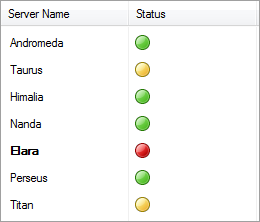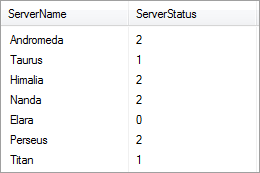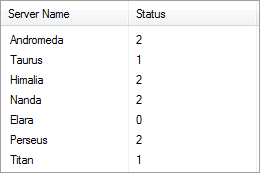Better ListView 3.5 have improved data binding functionality. You can adjust how the data rows will be converted to items/sub-items and vice versa. For example, you can show images based on the bound data:
Say you have a simple Server type:
C#
[csharp gutter=”false” toolbar=”false”]
public class Server
{
public string ServerName
{
get;
set;
}
public int ServerStatus
{
get;
set;
}
public Server(string name, int status)
{
ServerName = name;
ServerStatus = status;
}
}
[/csharp]
Visual Basic
[vb gutter=”false” toolbar=”false”]
Public Class Server
Public Property ServerName() As String
Get
Return m_ServerName
End Get
Set
m_ServerName = Value
End Set
End Property
Public Property ServerStatus() As Integer
Get
Return m_ServerStatus
End Get
Set
m_ServerStatus = Value
End Set
End Property
Private m_ServerName As String
Private m_ServerStatus As Integer
Public Sub New(name As String, status As Integer)
ServerName = name
ServerStatus = status
End Sub
End Class
[/vb]
This class contains two properties representing server name and its status. The server name is a textual property and one would like this mapped to item label as usual. However, the server status is a numerical value which have no meaning to the user even when converted to string. In fact, the numerical value can be 0 (offline), 1 (idle) or 2 (running). You may like to display color icons instead of plain strings or numbers. What if we would like to even highlight some items or change other properties during data binding? This is possible through Better ListView data binding customization.
First, let’s create a list of Server objects and bind this to a Better ListView. We would like to have columns auto-generated, so we set DataBindColumns to true:
C#
[csharp gutter=”false” toolbar=”false”]
Server[] servers = new[]
{
new Server(“Andromeda”, 2),
new Server(“Taurus”, 1),
new Server(“Himalia”, 2),
new Server(“Nanda”, 2),
new Server(“Elara”, 0),
new Server(“Perseus”, 2),
new Server(“Titan”, 1)
};
ImageList imageList = new ImageList();
imageList.ColorDepth = ColorDepth.Depth32Bit;
imageList.ImageSize = new Size(16, 16);
imageList.Images.AddStrip(Image.FromFile(“status.png”));
BetterListView listView = new CustomListView();
listView.DataBindColumns = true;
listView.DataSource = servers;
listView.ImageList = imageList;
[/csharp]
Visual Basic
[vb gutter=”false” toolbar=”false”]
Dim servers As Server() = New () {New Server(“Andromeda”, 2), New Server(“Taurus”, 1), New Server(“Himalia”, 2), New Server(“Nanda”, 2), New Server(“Elara”, 0), New Server(“Perseus”, 2), _
New Server(“Titan”, 1)}
Dim imageList As New ImageList()
imageList.ColorDepth = ColorDepth.Depth32Bit
imageList.ImageSize = New Size(16, 16)
imageList.Images.AddStrip(Image.FromFile(“status.png”))
Dim listView As BetterListView = New CustomListView()
listView.DataBindColumns = True
listView.DataSource = servers
listView.ImageList = imageList
[/vb]
Let’s take a look on the result:
The columns were auto-generated and Server properties properly converted to item and sub-item labels. The generated column header labels are just names of the corresponding properties (ServerName, ServerStatus). You can make the names more convenient by providing DisplayNameAttribute on the respective properties:
C#
[csharp gutter=”false” toolbar=”false”]
…
[DisplayName(“Server Name”)]
public string ServerName
{
get;
set;
}
[DisplayName(“Status”)]
public int ServerStatus
{
get;
set;
}
…
[/csharp]
Visual Basic
[vb gutter=”false” toolbar=”false”]
…
Public Property ServerName() As String
Get
Return m_ServerName
End Get
Set
m_ServerName = Value
End Set
End Property
Public Property ServerStatus() As Integer
Get
Return m_ServerStatus
End Get
Set
m_ServerStatus = Value
End Set
End Property
…
[/vb]
Now the column names are more user friendly:
We will finally add state images (instead of the numbers) and highlight some items. To do that, we have to override DataCreateItem method in a class derived from BetterListView:
C#
[csharp gutter=”false” toolbar=”false”]
public class CustomListView : BetterListView
{
protected override BetterListViewItem DataCreateItem(
CurrencyManager currentDataManager,
BindingMemberInfo[] currentDisplayMembers,
int index)
{
// create item using the base implementation
BetterListViewItem item = base.DataCreateItem(
currentDataManager,
currentDisplayMembers,
index);
// get server status from the current Server object
int serverStatus = ((Server)currentDataManager.List[index]).ServerStatus;
if (serverStatus == 0)
{
// bold item when server status is 0
item.IsBold = true;
}
// get sub-item corresponding to server status
BetterListViewSubItem subItemStatus = item.SubItems[1];
subItemStatus.ImageIndex = serverStatus; // set image for the sub-item
subItemStatus.Text = “”; // clear sub-item text
return item;
}
}
[/csharp]
Visual Basic
[vb gutter=”false” toolbar=”false”]
Public Class CustomListView
Inherits BetterListView
Protected Overrides Function DataCreateItem(currentDataManager As CurrencyManager, currentDisplayMembers As BindingMemberInfo(), index As Integer) As BetterListViewItem
‘ create item using the base implementation
Dim item As BetterListViewItem = MyBase.DataCreateItem(currentDataManager, currentDisplayMembers, index)
‘ get server status from the current Server object
Dim serverStatus As Integer = DirectCast(currentDataManager.List(index), Server).ServerStatus
If serverStatus = 0 Then
‘ bold item when server status is 0
item.IsBold = True
End If
‘ get sub-item corresponding to server status
Dim subItemStatus As BetterListViewSubItem = item.SubItems(1)
subItemStatus.ImageIndex = serverStatus
‘ set image for the sub-item
subItemStatus.Text = “”
‘ clear sub-item text
Return item
End Function
End Class
[/vb]
Now the control displays adjusted images and a highlighted item:
Note that you can customize data binding the other way as well by overriding the DataUpdateSubItemToSource method. This method is responsible for updating the bound data source when item/sub-item value have been modified.


